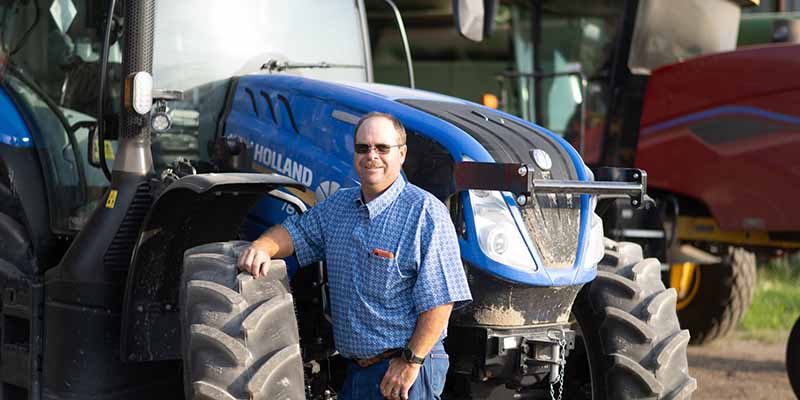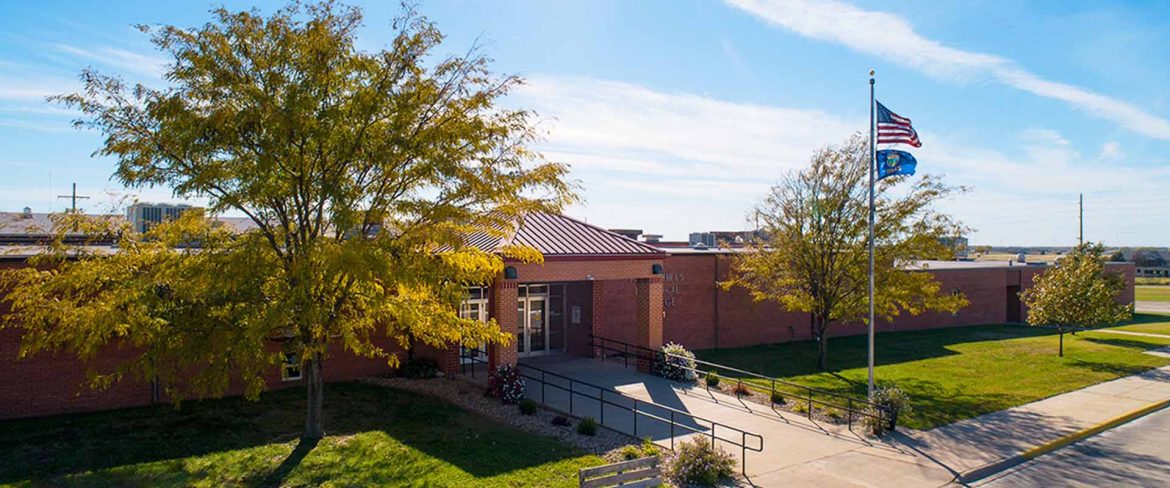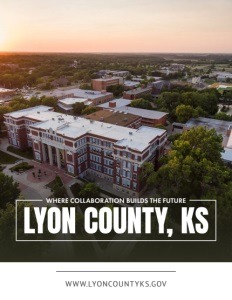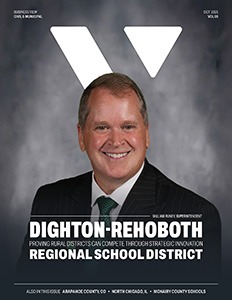Where Collaboration Builds the Future
A heartland hub proving that strategic partnerships are the most powerful economic engine.
Nestled in the heart of the Flint Hills, Lyon County, Kansas, represents the model “Goldilocks” community. It is a region that offers a strategic balance, providing access to metropolitan amenities and a highly skilled workforce without sacrificing the supportive atmosphere and manageable pace of a smaller community.
At its core lies the dynamic city of Emporia, a hub of innovation, education, and culture that drives the county’s economic engine. The remarkable story of Lyon County’s growth, however, is not just about location or infrastructure; it is a story of profound collaboration. From the city and county government to educational institutions and economic development organizations, a culture of intentional partnership creates a resilient and uniquely attractive environment for business investment and expansion.
A “Goldilocks” Lifestyle for Business and Life
Lyon County’s strategic positioning is a primary catalyst for its economic vitality. The county is centrally located at the crossroads of major transportation arteries, providing unparalleled logistical advantages for distribution and manufacturing. As Vice Chair of the Lyon County Commission, Chris Bartel, explains, “we have an excellent location, we’re right on I-35, 335, US-50, 99, centrally located between Topeka, Wichita, and Kansas City.” This is further bolstered by the BNSF rail line that runs directly through the region.
However, the appeal extends far beyond infrastructure. The area offers a quality of life that actively serves as a powerful tool for talent attraction and retention. Emporia State University, recognized as one of the top ten teachers’ colleges in the United States, elevates the entire educational ecosystem. The county is also an outdoor enthusiast’s paradise, officially designated as the “Gravel Riding Capital of the World” and the “Disc Golf Capital of the World,” hosting international events that draw thousands of visitors.
Unique ecological assets like the tallgrass prairie offer exceptional hiking, while the community is further enriched by its multicultural fabric and a renowned arts scene, including world-class glass blowing and pneumatic engraving. “From an agricultural perspective, we are a beef land, so quality restaurants. We’re kind of a foodie area that is sought after within the local region,” notes Casey Woods, Executive Director of Emporia Main Street.
Complementing this dynamic lifestyle is a robust healthcare infrastructure. Newman Regional Health operates as a critical access, county-owned hospital with a full-service emergency room and obstetrics ward. Adding to this capacity, Bartel notes, “Stormont Vail is getting ready to spend over $40 million to build a new healthcare clinic on the other side of town.” This combination of strategic location, cultural richness, and essential services creates a complete package, ensuring that both businesses and their employees don’t just succeed, they flourish.
“You get to live more life here,” Woods reflects. “It’s easier to integrate yourself in this local community, there’s always room to get involved and form your own niche and create a quality life within this region.”

A Master Plan Fueled by Partnership
The revitalization of downtown Emporia stands as a testament to Lyon County’s strategic and sustained approach to economic development. “From a downtown perspective, over the past 34 years, we’ve had $175 million worth of reinvestment within the downtown area,” explains Woods.
“We’ve created about 1,000 new jobs in the last five years through expansions and business attraction,” adds Mayor of the City of Emporia, Erren Harter.
This growth is fueled by a powerful toolkit of initiatives. The area’s historic district status has been a key catalyst, and the city made history itself by becoming the first community in Kansas to enact an Upper Story Rural Housing Incentive District (RHID).
A cornerstone of this entrepreneurial ecosystem is the fabrication lab, which Woods notes that “last year helped 212 different businesses develop their own products or sideline opportunities for local businesses.”
This proactive support extends through a comprehensive suite of financial incentives designed to make business development seamless. From the city and county perspective, the offerings are extensive.
As Bartel outlines, these local performance-based incentives include “industrial revenue bonds, property tax abatements, sales tax exemptions, community development block grants, discounted land and infrastructure improvements, tax increment financing,” amongst others.
Complementing these incentives is the Network Kansas E-Community program, housed at Emporia Main Street, which has loaned over $2 million to local businesses in expansion mode, alongside zero-interest loan programs and nationally-modeled classes for startups.
Orchestrating this symphony of collaboration is the Regional Development Association (RDA), which serves as the critical link between all entities. As Public Relations Manager Vici Smith notes, the RDA is a key group “that works in connection with Casey, the city, and the county to bring in even bigger development opportunities.”
The ongoing process of hiring a new RDA director is seen not as a challenge, but as a strategic step to further amplify and focus these coordinated efforts, ensuring that the county’s economic momentum continues to accelerate through unified purpose and partnership.
Building for Tomorrow: Strategic Focus on Housing and Workforce
Acknowledging that growth requires more than just opportunity, Lyon County leadership is executing a deliberate strategy around its two most critical assets: people and place.
The city and county have been aggressive in supporting developments, from single-family homes to senior living facilities proximate to the hospital. This has resulted in over 300 new housing units in the downtown area alone in the last 15 years, with an additional 67 to 73 units currently on deck.
“It’s not just housing availability, it’s the right type of housing that meets the psychographic and demographic groups that we’re trying to make sure are successful within the area,” Woods explains.
This commitment extends to the county’s smaller towns, like Olpe, where new residential developments are enhancing their appeal for young families seeking excellent schools with low student-teacher ratios.
Parallel to this is an equally sophisticated and proactive workforce development system. The area’s educational institutions, Emporia State University and Flint Hills Technical College, are not passive entities but active partners engaging directly with local employers to tailor their curriculum.
“Both schools have revamped and strengthened their programs to specialize for the local workforce,” notes Bartel. “These two have done an excellent job going out, asking questions, listening to what the local employers need, and then going back and creating new programs…to me, that shows their commitment to providing a very positive impact on the county and the city.”
This unique responsiveness ensures a pipeline of talent equipped with relevant skills, with synergy further strengthened by both institutions employing dedicated economic development officers. “Both of our higher educational institutions are very adaptive,” notes Woods.

Core Industries and Critical Infrastructure
The Lyon County economy is powered by a diverse and resilient base of core industries. Its strategic location naturally fosters a strong distribution and logistics sector, while manufacturing, educational services, and healthcare represent other key pillars.
A standout feature is its position within the “Animal Health Corridor,” hosting global leaders like Hill’s Pet Nutrition, Simmons Pet Food, and Cargill. This cluster benefits from a business-friendly environment where, as Bartel puts it, “Communication is key. We will always listen to concerns and new ideas for growth.”
Supporting this robust commercial activity is a continuous and significant investment in critical infrastructure. The City of Emporia has executed approximately $65 million in utility upgrades, including “putting in a 20-inch main from our water treatment plant… running all the way to the southeast side of town, which is where our largest users are,” says Harter.
A parallel commitment is evident in public safety, with $18-20 million allocated for new fire stations and a new county-owned 9-1-1 emergency call center with an integrated shooting range for law enforcement, underscoring that “safety is a top priority,” says Bartel.
Furthermore, the county is a proven leader in digital infrastructure, a critical differentiator for modern business. It boasts redundant fiber optic access and is a participant in the multi-million dollar Free State Network project. Woods confirms this advanced standing, noting, “When it comes to broadband, we’re pretty advanced for a rural area.” The presence of the nearby Wolf Creek Nuclear Power Plant further signals the region’s capacity to host complex, high-tech industries, serving as a testament to the available, highly skilled, and security-cleared workforce.
Looking Ahead: Priorities for Sustained Growth
Even with significant momentum, Lyon County’s leadership is focused on addressing the challenges that accompany growth. The priorities for the next 18-24 months are clear and actionable. A primary focus is closing the childcare gap, with recent progress including the conversion of a vacant school into a childcare center.
The push for strategic housing development will continue unabated to meet diverse demographic needs. Modernizing public safety communication systems is also essential to keep pace with expansion. Finally, an urgent and collaborative mission is underway to repurpose the recently closed Tyson plant, an effort that already showcases the community’s responsive and unified approach to economic resilience.
As Bartel states, this is a top priority, emphasizing, “we are pushing hard to find someone to utilize that facility, putting resources into it, doing everything we can between the county, the city, Main Street, and RDA.”
“Not only are we pursuing large business development, but we also don’t want to overlook what we already have. So the small, medium, and large businesses we already have, we’ll do whatever we can to help them expand and create new opportunities,” Bartel adds.

The Lyon County Promise: Partnership for the Future
Lyon County’s blueprint for success is undeniably rooted in its powerful culture of collaboration. This unified model between public, private, and educational entities creates a resilient and responsive ecosystem. The county firmly positions itself not merely as a location for business, but as a premier and proactive partner committed to fostering long-term, sustainable growth in the American heartland.
AT A GLANCE
Who: Lyon County, Kansas
What: A collaborative economic powerhouse offering strategic logistics, a skilled workforce, and a proven blueprint for business growth and quality of life
Where: The Flint Hills region of Kansas
Website: www.lyoncountyks.gov
PREFERRED VENDORS
Frank Black Pipe & Supply Co. : www.frankblackpipe.com
Offering dependable service and delivery on our own trucks since 1989, Frank Black Pipe & Supply Co. provides new and used steel pipe from ½” to 48” diameter. We also stock variety of structural steel shapes and pipe clips, post caps, and steel plate. Come see us in McPherson, Kansas!



